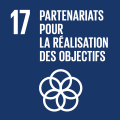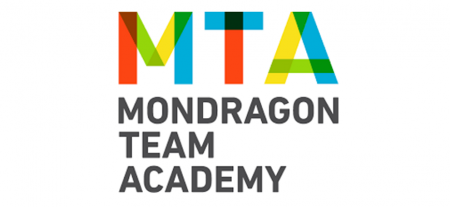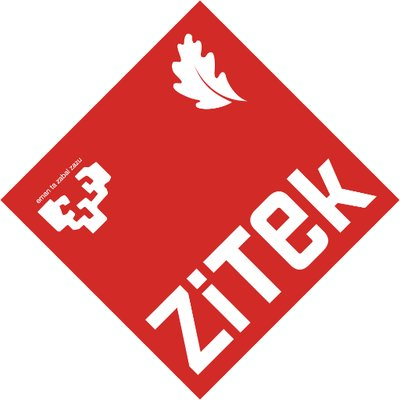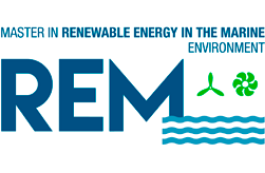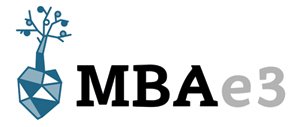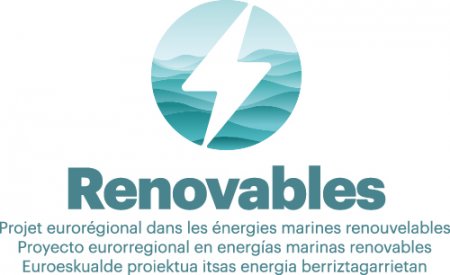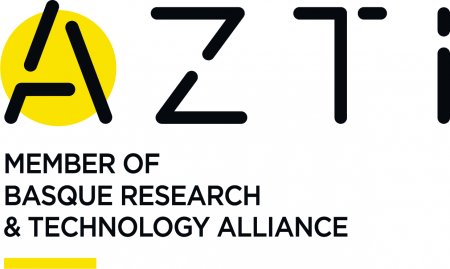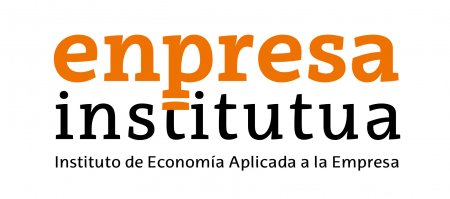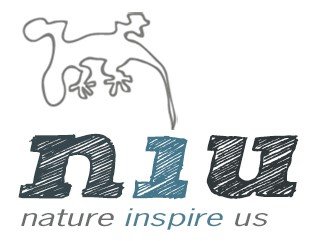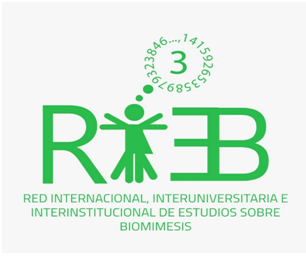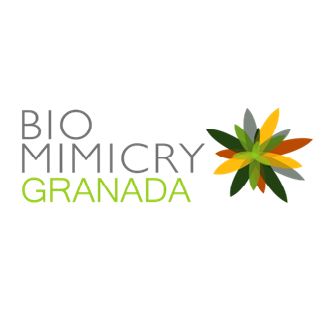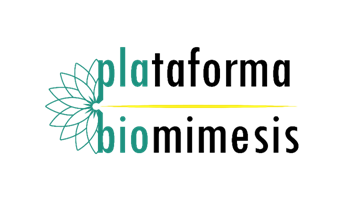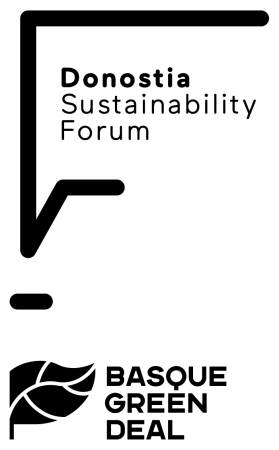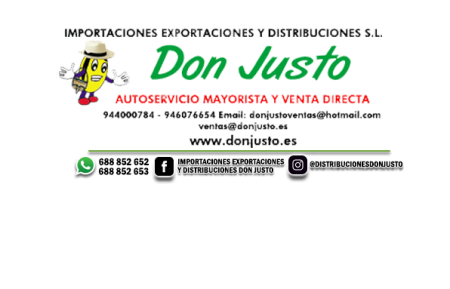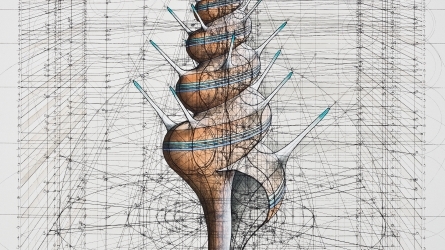
Biomimesis: Una propuesta multidisciplinar para afrontar los retos de sostenibilidad post-covid
Description
This Summer Course will be held face-to-face and there will also be the possibility of participating live online through ZOOM. In the registration process, please select the participation of your choice: face-to-face or live online.
The world economy must implement processes of transformation in its forms of production of goods and services because it is in a finite world, since the fundamental premise that sustains it of indefinite growth is impossible to achieve, therefore companies must be the engine of such change, with a commitment to achieve convergence towards a circular economy of materials, renewable energy efficiency and knowledge. This is achieved through a dynamic, dialectic, reflexive and inclusive process related to the possibility of producing, transforming, commercialising and consuming goods and business services that simulate the economy of nature, since it does not produce waste but nutrients, internalising everything in the ecosystem process at the level of the terrestrial biosphere-atmosphere.
Today's companies and institutions have to adapt to the requirements of the new knowledge economy. To this end, the new educational and human training processes related to the company must foster business entrepreneurship processes based on natural models based on reflective, critical and complex thinking.
From the biomimetic perspective, the central premise is that respect for nature and biodiversity must be the driving force for the transformation of the economy. In view of this scenario, a scenario is provided for reflection and practice in which it is proposed to emulate nature and strategies are proposed so that socioeconomic systems can emulate "the economy of nature". The fundamental premise is based on the fact that nature has its own economic structures that are highly efficient in sustainable terms by providing closed cycles of materials and energy. The human economy, in order to be viable in time and space, must be based on bio-inspired business innovation (eco-innovation). To this end, it is proposed to take as a source of inspiration the efficient use of natural resources in natural processes
This "Bioinspired Business Innovation" Summer Course aims to raise awareness of Biomimicry through theoretical and practical sessions with the active participation of those attending in order to promote understanding and integration of the discipline into professional training in the disciplines of administration, economics and engineering, among other areas of scientific and social knowledge. For optimal use of the course, online resources and specialized technical literature, seminars, workshops, among other educational resources are provided. The Summer Course is led by researchers from a specific research network on the subject (the Ri3 Biomimicry Network), which includes a group of professors from several universities and research centers as speakers. It is also supported by the UPV/EHU Economic and Employment Sciences Institute.
Objectives
It is intended to reflect with the attendees on the subject of business bioinspiration. The aim is to promote and consolidate educational and training processes for professionals from different disciplines who lead and will lead business administration in its different modalities, so that they can respond to future challenges of a circular and knowledge economy, inspired by eco-innovation related to the processes of nature, taking as premises the postulates of Biomimicry related to the finite planetary limits, preserve the natural heritage and the diversity that characterizes the natural and cultural landscape.
The complexity of the object of study has led us to propose a series of secondary objectives that will enable us to respond to the initial objective proposed. The following are the proposed subsidiary objectives:
- To provide attendees, professionals and entrepreneurs with the philosophy that sustains the postulates of Biomimicry, as a new technical-scientific-productive paradigm.
- To know, understand and apply the Biomimicry methodology.
- To enrich the perception of Nature as a model of infinite source of inspiration for new products and business services, related to eco-innovation strategies, for a market in constant competition and demand for environmentally friendly products.
- To influence the implementation of the so-called convergent and regenerative technologies. This allows exploring the capabilities, opportunities and potentialities in relation to its natural capital base to generate new companies and projects related to cutting-edge knowledge.
- To implement skills among business professionals, designers, public policy makers and other social actors, with the purpose of interpreting new trends and scenarios related to the new economy and knowledge society in order to project future scenarios that respond to responsible consumption strategies and sustainable business initiatives.
- Implement, contribute and consolidate dynamics of interdisciplinary networking around the new knowledge economy and circular economy.
- To support in an innovative way business practices integrating bio-inspired environmental and social aspects.
- To know and explore examples and successful cases as best practices in the biomimetic discipline.
- To understand the multidimensionality of biomimicry and bioeconomy in the context of a complex environment and society.
Activity directed to
- University students
- Teachers
- Professionals
- All public
Methodology
The Summer Course is presented by theoretical and applied explanations, with limited space for discussion in each of them. During the event, a discussion area will be set up as a table area, which will lead to critical reflection. At the same time, it may work in a cooperation space, following active and innovative methodologies, desing thinking technique, through workshops planned for this purpose. This view facilitates the realization of indirect and complex capabilities, such as promoting critical thinking, creativity, or tolerance from a multi-disciplinary and cultural point of view. All this will lead to a series of conclusions in which both speakers and attendees will be able to participate collaboratively during the event.
Program
08-07-2021
Registro
Presentation by the Director of the activity
- Unai Tamayo Orbegozo Miembro fundador de la Red Internacional de Estudios sobre Biomímesis (RI3BIOMIMICRY NETWORK)
- Hernando Bernal Zamudio Biomimetic Sciencie Institute, Asociación Amassunu Universidad del País Vasco, Miembro fundador de la Red Internacional de Estudios sobre Biomimesis, Red Internacional Ruralidades Ecológicas (RIRES), Plataforma Internacional Estudiantil Biomimesis. Expert
“Educación Ambiental al servicio de los ecosistemas“
- Ibone Ametzaga Arregi Cátedra Unesco de Desarrollo Sostenible y Educación Ambiental - Directora
“Bimomimicry. Philosophy at the service of Responsible research and innovation“
- Vincent Blok Professor in philosophy and ethics of business, Wageningen University, Netherlands - (Este ponente intervendrá vía Zoom)
“Re-conexion con la naturaleza y metodología biomimética“
- Manuel Quirós Galdón NatureInspireUs y Planeta Biomimético España
- Vanessa Hansson de Oliveira Dra. de la Fundación MAPAS y Asesora del programa Harmony with Nature de Naciones Unidas - (Esta ponente intervendrá vía Zoom)
“Simbiosis plantas-microorganismos para la recuperación de suelos contaminados “
- Carlos Ander Garbisu Crespo Neiker
“Proyección de Video sobre Matemáticas y Naturaleza“
- Raúl Ibáñez Torres UPV/EHU
Break
“Taller: "Bosques comestibles"“
- Lide Rodríguez Martínez TEKURA
“Mesa debate interdisciplinar sobre Eco-pedagogía: una mirada a la Biomimesis desde latinoamérica“
- David Sánchez Ruano Tecnológico de Monterrey, México - (Este ponente intervendrá vía Zoom)
- Daniel Edgardo Vedoya Universidad Nacional del Nordeste, Argentina - (Este ponente intervendrá vía Zoom)
- Gloria Marlene Díaz Universidad Externado, Colombia - (Esta ponente intervendrá vía Zoom)
- Nicolás Jiménez Iguarán Universidad Nacional a Distancia UNAD, Colombia - (Este ponente intervendrá vía Zoom)
- Verónica Patricia Gallardo Reinoso Universidad Regional Amazónica IKIAM, Ecuador - (Esta ponente intervendrá vía Zoom)
- Germana de Oliveira Moraes Profesora emérita de la Universidad Federal de Ceará, Brasil y Jueza Federal de Brasil - (Esta ponente intervendrá vía Zoom)
“Biomimesis, bioeconomía y casos de éxito de proyectos ecoinnovadores“
- María Saiz Santos Directora de Emprendimiento y Dirección de Empresas, MBAe3
- José Miguel León Bee Agritech
“Biomimesis y Bioeconomia. Conocimiento científico y aportaciones de valor en armonía con la Naturaleza“
- Unai Tamayo Orbegozo Instituto de Economía Aplicada a la Empresa UPV/EHU
- Leire Barañano Orbe NEIKER - Directora
Cierre y Síntesis de la jornada
“Taller I de Emprendizaje bioinspirado (MU Mondragón Unibertsitatea / Biomimicry Granada). En el Parque de Doña Casilda se hará una sesión Bio-inspirada y se entregarán unos Snacks Naturales. “
- Beñat Urrutikoetxea Arrieta Universidad de Mondragón-Team Academy
- Luis Calle Sánchez Biomimicry Granada
- Carolina Veloso Ferreira Biomimicry Granada
“Bioarte. Sesión de txalaparta en el parque de Doña Casilda“
- Karlos Galán Robles Txalapartari, txistulari, albokalari, trikitrilari y dantzari
- Ander Lezamiz Txalapartari, txistulari, albokalari, trikitrilari y dantzari
---------------------------------------------------------
Paralelamente se ofrecerá la "EXPOSICIÓN BIOARTE"
“CONFERENCIAS PREGRABADAS“
- Serena Pisano Museo di Roma (Italia): “Bioarte y arte transgénero”
- Ludovica Rossi UPC, Cataluña (España): “Biomimetica y reciclaje creativo”
- Isabella Sabrié "Biomimesis y Música: la armonía ritmo espacial"
- Xavi Bou "Mumurations"
“EXPOSICIONES EN SALA DE PINTURA, ESCULTURA Y MÚSICA“
- Alexandra Castellanos Perdigón Asociación ASOCOLVAS (Colombia): “Biomimesis y aromas de la Naturaleza”.
- Manu vb Tintore (Bélgica): “Exposición pintura Armonía Natural”
- Rafael José Araujo Pimentel (Venezuela): “Exposición pintura Naturaleza geometrizada”
- Omar Rodríguez Da Silva (Brasil/Colombia): “Exposición pintura Amazonia biomimetizada”
- Jaime Enrique Salinas Bernal (Costa Rica/Colombia): “Exposición escultura alienígena”
- Hugo Salinas Intiraimi (Argentina): “Exposición de obras orgánicas Bioinspiradas”
- Isidro Salinas Salinas (Argentina): “Música Andina, el sonido de la Naturaleza”
- Javier Diego Iraeta "Aves y Felinos del paraíso perdido"
“PROYECCIONES DOCUMENTALES CULTURALES“
- José Claudio Rocha Universidad Estadual de Baia (Brasil): “Biomimesis y manifestaciones culturales populares”
09-07-2021
“Taller II de Emprendizaje bioinspirado (MU Mondragón Unibertsitatea / Biomimicry Granada). Actuación en Artxanda del grupo de música "Os Recunchos Das Pontes". Se ofrecerá también un pick-nick de la mano de Hummus Sapies. “
- Beñat Urrutikoetxea Arrieta Universidad de Mondragón-Team Academy
- Luis Calle Sánchez Biomimicry Granada
- Carolina Veloso Ferreira Biomimicry Granada
- Grupo Os Recunchos Das Pontes Grupo de música aficionado
Apertura, conclusiones de día anterior y explicación de la estructura de la sesión: Unai Tamayo Orbegozo (Instituto de Economía Aplicada a la Empresa de la UPV/EHU)
“Biomimesis, diseño arquitectónico e innovaciones sostenibles“
- Alex Mitxelena Etxeberria Arquitectura de la UPV/EHU
“Biothinking y Fuentes de financiación para la investigación biomimética aplicada“
- Carmen SanFrancisco Directora de Biomimetics Sciences Institute (BSI)
“Casos de éxito de emprendizaje bioinspirado “
- Noemi Peña Miguel (Roseo) - Responsable de ZITEK
- Teresa López de Armentia Iturralde Zabalketa
Round table: “Mesa debate interdisciplinar sobre Bioinspiración y adaptación al medio natural“
- Unai Tamayo Orbegozo Instituto de Economía Aplicada a la Empresa UPV/EHU (Moderator)
- Manuel Quirós Galdón NatureInspireUs y Planeta Biomimético España
- Hernando Bernal Zamudio Biomimetic Sciencie Institute, Asociación Amassunu Universidad del País Vasco, Miembro fundador de la Red Internacional de Estudios sobre Biomimesis, Red Internacional Ruralidades Ecológicas (RIRES), Plataforma Internacional Estudiantil Biomimesis. Expert
- Teresa López de Armentia Iturralde Zabalketa
- Noemi Peña Miguel (Roseo) - Responsable de Zitek
Break
“Hidrodinámica y el poder de la naturaleza al servicio de las energías renovables“
- Jesús María Blanco Ilzarbe UPV/EHU - Coordinador del Master in Renewable Energy in the Marine Environment
- Jesús Esarte San Martín Unidad de Negocio de Mecatrónica (NAITEC)
“Economía Circular, Biomimética aplicada para nuevos materiales fotónicos y de almacenamiento de energía“
- Erlantz Lizundia Fernández Master en Economía Circular: aplicación a la empresa UPV/EHU
“Biomimesis y civilización ecológica: una mirada femenina en armonía con la Madre Tierra “
- Nelly Cuiro Lideresa indígena en Ecofeminismo en el Amazonas (Asociación Nimaira) - (Esta ponente intervendrá vía Zoom)
- María Mercedes Sánchez Dra. del Programa Harmony with Nature de Naciones Unidas - (Esta ponente intervendrá vía Zoom)
- Fernando Antonio Carvahlo Dantas Miembro del Consejo Científico del Observatorio Brasileño de la Justicia y Miembro especialista de la Plataforma de Armonía con la Naturaleza de las Naciones Unidas (ONU) - (Este ponente intervendrá vía Zoom)
- Susana Borrás Pentinat Grupo de Investigación sobre Derecho ambiental, Inmigración y Gobierno Local de la Universidad Rovira i Virgili en el Centro de Estudios en Derecho Ambiental de Tarragona (CEDAT) - Investigadora (Esta ponente intervendrá vía Zoom)
- Vania Susana Calle Quispe Universidad Mayor de San Andrés -UMSA- , La Paz, Bolivia - (Esta ponente intervendrá vía Zoom)
Conclusiones y cierre de las jornadas (Unai Tamayo Orbegozo, Economía y Empresa de la UPV/EHU)
Directors
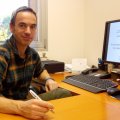
Unai Tamayo Orbegozo
UPV/EHU
Founding Partner of the Ri3 Biomimicry Network. PhD in Economics and Business Sciences from the UPV/EHU. Vice-Dean of Euskera, students and employability of the Faculty of CC. Economics and Business Studies of the UPV/EHU. Researcher in Ecological Marketing (Numerous articles on Waste Management, ecological purchasing behavior, environmental management strategies, ...). Actively involved in sustainability tasks (Member of the Environmental Management Committee of the Faculty, active participation in talks on sustainability of the university curriculum, ...). Lecturer in the Master of Sustainable Development and SDGs of the Unesco Chair and the Master in Circular Economy of the UPV/EHU, among others. Coordinator of the Thematic Study on Ecoinnovation in a collaboration project between UPV/EHU and Innobasque. Member of the Jury of the Invisible Film Festival. Member of the Scientific Committee of the AIMPN International Congress. Used to the use of active learning methodologies.
Hernando Bernal Zamudio
Biomimetic Science Institute y Asociación Amassunu, UPV/EHU
Agrologo, Maestría en Desarrollo Rural, PhD. Estudio de Desarrollo y Cooperación Internacional. PhD(c) Agroecologia, Sociología y Desarrollo Rural Sostenible. Presidente de la Asociación Amassunu para Impulso de la Interculturalidad y la Biomimesis. Cofundador de la Red Internacional, Interuniversitaria e Interinstitucional de Estudio de Biomimesis. Profesor de la Maestría en Medio Ambiente, Sostenibilidad y los Objetivos de Desarrollo Sostenible (ODS), Cátedra Unesco de Desarrollo Sostenible y Educación Ambiental, Universidad del País Vasco. Profesor de la Maestría en Agroecología, soberanía alimentaria, agricultura urbana y cooperación al desarrollo rural. Universidad de la Laguna. Coautor del documento para la UNESCO, BM, PNUD, FAO, FIDA, UNICEF, IICA: “Análisis de la evolución de los sistemas del conocimiento, ciencia y tecnología en América Latina y el Caribe. Su efectividad e impacto”. Capítulo 2. Sub Global Reports.
Speakers
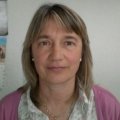
Ibone Ametzaga Arregi
UPV/EHU
Profesora agregada del Área de Ecología de la Universidad del País Vasco (UPV/EHU). Ha sido profesora en la Universidad Pública de Navarra y en la Universidad de Vigo y ha trabajado en el centro de investigación NEIKER (2002-2003). Ha sido presidenta de la sección de ciencias naturales de Eusko Ikaskunta/Sociedad de Estudios Vascos (1995-2006). Ha realizado estancias en diversas universidades internacionales como University of Aberdeen, el Imperial College of Science and Technology, University of California at Santa Barbara o la University of Oxford. Ha dirigido varias Tesis doctorales, de Grado y de Máster y ha publicado más de 50 artículos en revistas científicas, libros y capítulos de libro. Su temática de investigación se centra en el estudio de la biodiversidad, principalmente en ecosistemas terrestres, con el objetivo de evaluar los impactos sobre la misma y desarrollar actuaciones para mejorar su situación.
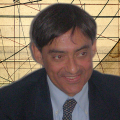
Rafael José Araujo Pimentel
Estudié arquitectura porque dibujaba bien. No dibujo porque estudiara arquitectura. Desde muy joven me interesaron los patrones evidentes de las criaturas orgánicas y el mundo en general: las espirales de una piña, las escamas de los peces. Los ojos facetados de las libélulas. Paralelamente, manejaba las herramientas básicas del dibujo en perspectiva y a través de ellas me fue posible la creación de un lenguaje de representación tridimensional de todas esas cualidades que tanto me llamaban la atención en el entorno circundante. Una de las características recurrentes en mi trabajo es la búsqueda platónica de la “verdad”, donde cada dibujo es una especie de ecuación donde todo se desarrolla de la única manera posible para las variables utilizadas. En esa búsqueda de la perfección, se hace imprescindible el manejo óptimo de las proporciones y entre estas destaca la Razón Áurea, la sucesión de Fibonacci y el número Phi que correlaciona a ambos.
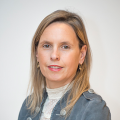
Leire Barañano Orbe
General Manager of NEIKER. She is a member of the governing boards of the Elhuyar Foundation and the Elika Foundation, of the board of the European Forest Institute (EFI) and of the board of directors of the Basque Research and Technology Alliance (BRTA). In 2021, he joined the Basque Council for Science, Technology and Innovation.
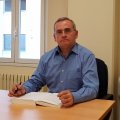
Jesús María Blanco Ilzarbe
Professor of the Department of Energy Engineering of the UPV/EHU. He holds a PhD in Industrial Engineering (1996). Msc. Cranfield Univ. (UK), in marine turbines where he is a visiting professor and made 3 research stays with MINECO grant. He has supervised 5 theses and currently has 7 doctoral students, 42 JCR, 59 international research papers and 27 teaching papers, co-author of 2 patents, 28 book chapters and 7 books. He has led more than 30 research projects as well as transfer contracts to the company in computational simulation (CFD). Regular referee of several JCR journals. 2 UNED awards (energy) and Academy of Sciences of Cuba 2016. Organizer of international congress (CMN'2013), member of scientific committee of several international congresses. Member of the Spanish Society of Numerical Methods in Engineering. Coordinator of Msc ERASMUS MUNDUS in offshore EERR (REM and REM+). IP research group GV (IT1314-19) in EERR.
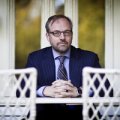
Vincent Blok
Dr. Vincent Blok is Associate Professor in Sustainable Entrepreneurship, Business Ethics and responsible innovation at the Management Studies Chair Group, and Associate Professor in Philosophy of Management, Technology & Innovation at the Philosophy Chair Group, Wageningen University (Netherlands). From 2002 to 2006, Blok held various management functions in the health care sector. In 2006, he became director of the Louis Bolk Institute, an international research institute in the field of organic and sustainable agriculture, nutrition and health care. In 2005 he received his PhD degree in philosophy at Leiden University with a specialization in philosophy of technology. Blok pursues three lines of research - Business Ethical Issues in Sustainable Entrepreneurship, Philosophy of Management, Technology & Innovation, and Responsible Innovation in the private sector.
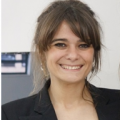
Susana Borrás Pentinat
Susana Borràs Pentinat es profesora de Derecho Internacional Público y Relaciones Internacionales en la Facutat de Ciències Jurídiques de la Universitat Rovira i Virgili (Tarragona, España). Obtuvo el título de Master en Derecho ambiental en 2004 y el grado de doctora en derecho ambiental en 2007. Es investigadora en el Grupo de Investigación sobre Derecho ambiental, Inmigración y Gobierno Local de la Universitat Rovira i Virgili en el Centro de Estudios en Derecho Ambiental de la Universitat Rovira i Virgili (www.cedat.cat). Actualmente, es la coordinadora del Master de Derecho Ambiental en la Universitat Rovira i Virgili. Ha sido investigadora en diferentes instituciones en el ámbito del derecho ambiental: en el Committee on Challenges of Modern Society (NATO/CCMS) en Bélgica e investigadora en el Max Planck Institut für ausländisches öffentliches Recht und Völkerrecht, Heidelberg (Alemania), en el Center of International Environmental Law (CIEL) en Washington (EUA)...
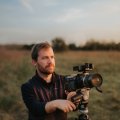
Xavi Bou
Licenciado en Geología en la Universidad de Barcelona mientras estudiaba Fotografía en la escuela Internacional de Fotografía Grisart. Al completar sus estudios el 2003, empezó su carrera profesional en el mundo de la fotografía de moda y publicidad como asistente de fotógrafos. El 2009 fundó, junto con su socio Dani Ciprian Lacrin Studio, un estudio de retoque especializado en campañas para importantes marcas y revistas nacionales e internacionales. Durante esta periodo también impartió clases de Postproducción Digital. Desde que el 2015 presentó en el Observatorio su proyecto Ornitografías se ha ido convirtiendo en su ocupación profesional principal. Este proyecto lo ha llevado a publicar en los principales periódicos Europeos de más renombre como "The Guardian", “Volkstrant", "Sonntag" "The Spiegel" y en revistas como National Geographic o Geo entre muchas otras y en docenas de publicaciones online de todo el mundo. Ha expuesto en Holanda, Estados Unidos, Cataluña, Francia, México.
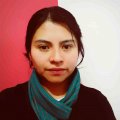
Vania Susana Calle Quispe
Arquitecta, graduada en la Universidad Mayor de San Andrés, Facultad de Arquitectura Artes Diseño y Urbanismo, por excelencia, posee un Máster en Ordenamiento Territorial y Planificación Urbana. Coordinadora de la Maestría en Ordenamiento Territorial en la FAADU – UMSA, es autora y coautora de libros, expositora nacional e internacional en México, Colombia y Ecuador. Consultora, trabajó en entidades de administración pública, es docente investigadora en la Facultad de Arquitectura Artes Diseño y Urbanismo de la Universidad Mayor de San Andrés. Miembro en investigación de la Asociación de Estudios Bolivianos, la Red Iberoamericana de Investigadores sobre Globalización y Territorio, Red Multidisciplinaria de C3 Ciencias de la complejidad y la Red Internacional de Estudios Sobre Biomìmesis -RI+3 Biomimicry Network, la Asociación Boliviana Para el Avance de la Ciencia “ABAC” y la red de Epistemología de las Ciencias, las artes y cultura del pensamiento andino.
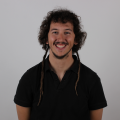
Luis Calle Sánchez
Founding partner in Biomimicry Granada.
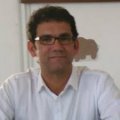
Fernando Antonio Carvahlo Dantas
Licenciado en Derecho, Doctorado y Maestría en Derecho de las Relaciones Sociales de la Universidad Federal de Paraná. Profesor de Teoría del Derecho en la Universidad Federal de Goiás. Profesor del Programa de Posgrado en Derecho Agrario de la Universidad Federal de Goiás. Profesor del Programa de Posgrado en Derecho Agroambiental de la Universidad Federal de Mato Grosso y del Programa de Posgrado en Ciencias de la Sociedad de la Universidad Federal de West Para. Fue director del Centro de Estudios Sociales de América Latina (CESAL). Miembro del Consejo Científico del Observatorio Brasileño de la Justicia y Miembro especialista de la Plataforma de Armonía con la Naturaleza de las Naciones Unidas (ONU). Fue profesor invitado en el Programa de Doctorado en Derecho de la Facultad de Derecho de la Universidad de Sevilla y en el Programa de Doctorado en Derechos Humanos y Desarrollo de la Universidad Pablo de Olavide en Sevilla, España.
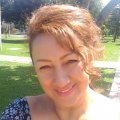
Alexandra Castellanos Perdigón
Fisioterapeuta, Terapias Alternativas Universidad del Rosario, Bogotá (Colombia), Osteopata Ised Bilbao. Centro de formación en terapia floral Transformar de Costa Rica, Asociación Iberoamericana de Terapeutas florales de México, Seflor Sociedad Española para la Investigación Terapéutica Floral, Naturista, Herbologa Fundaciòn Unihombre, Homeópata Asociación Colombiana de Homeopatía. Actualmente vinculada a la Asociación ASOCOLVAS.
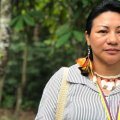
Nelly Cuiro
Communicator, producer and director of audiovisual media of the Murui people. National Commissioner for Communication of the Indigenous Peoples of Macro-Amazonia in the National Indigenous Organization of Colombia (CONCIP-ONIC). Coordinator of the First School of Indigenous Communication in the Macro-Amazon CAł JANA UAI. President of the Indigenous Women's Foundation Nimaira-Amazon. Member of the network of communicators of the Panamazónia Ciber Amazonas. Leader of the autonomous processes of indigenous women of the Amazon in the framework of the conformation of the cultural movement of Amazonian women.
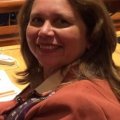
Germana de Oliveira Moraes
Professor of Constitutional Law at Universidade Federal do Ceará (UFC). Dean of the Graduate Law Program at UFC where she is responsible for the subjects Rights of Nature and Latin American Democratic Constitutionalism. PhD in Juridical-Political Sciences from the University of Lisbon, Portugal (1998). Graduation (1984) and Master's Degree (1989) in Law from Universidade Federal do Ceará. Post-doctorate at Pontifícia Universidade Católica do Paraná (PUC-PR), (2013). Professor Emerita at Universidade Federal do Ceará (UFC) and Federal Judge of Brazil.
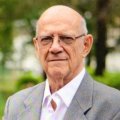
Daniel Edgardo Vedoya
Argentine Architect (Province of Corrientes, Argentina). Doctor in Art (2012). Undergraduate and Postgraduate Professor. Professor of CONSTRUCTIONS II and STRUCTURES III, Architecture, Faculty of Architecture and Urbanism (FAU), Universidad Nacional del Nordeste (UNNE). Researcher categorized "I" (CIN). Former Dean of the FAU-UNNE (1986-1990 and 1996-2000). Co-responsible for International Research and Development Projects. Director of R&D Projects, Master's and Doctoral Thesis, Interns and Scholarship Holders. Director of ITDAHu, at FAU-UNNE. Lecturer in Congresses, Seminars and Scientific Meetings. Author of books, book articles and articles in specialized journals. Peer evaluator of CONEAU for undergraduate and graduate courses in Argentina. Founding Member of the Regional Network of Architectural Technology, of Faculties and Schools of Architecture of Latin America. Active Member of the Argentine Scientific Society.
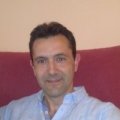
Jesús Esarte San Martín
Investigador principal en Fundación de Automoción y Mecatrónica (NAITEC). Es Doctor internacional en Ingeniería Industrial Térmica (2017) por la UPV/EHU, Investigador invitado en NEDO laboratorio de la Universidad de Cardiff (2004-2006), Profesor asociado en el Dpto de Termodinámica-Energía de la UPNa (1998-2002). Cuenta en la actualidad con 18 artículos JCR, 2 capítulos de libro y con más de 30 ponencias en congresos internacionales de investigación. Ha liderado y participado en más de 20 proyectos de investigación Nacionales e Internacionales en el ámbito de la gestión térmica y simulación CFD. Miembro del comité científico del congreso Heat Powered Cycles y coorganizador del HPC 2021.
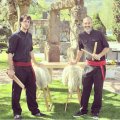
Karlos Galán Robles
Profesional de la música popular y folclórica vasca, es txalapartari, txistulari, albokalari, trikitrilari y dantzari. Con una amplia experiencia en eventos en el ámbito público como en el privado: bodas, homenajes, inauguraciones, recepción a grupos de turistas, entregas de premios, etc. Nos ofrece muchas posibilidades de integrar la cultura vasca, con un toque original a sus actos importantes, y, a la vez, hacer un guiño a nuestra cultura milenaria.
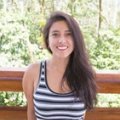
Verónica Patricia Gallardo Reinoso
Passionate about conservation, changing consumption patterns and sustainability. She studied biotechnology engineering at the University of the Armed Forces in Ecuador. She received a scholarship from the national government, through the Secretariat of Higher Education, Science, Technology and Innovation (SENESCYT). She studied her master's degree in integrated water resources management at the University of Queensland, Australia. At the Universidad Regional Amazónica Ikiam, she is the director of the Agroecology Engineering program and teaches in the Water Science Engineering and Agroecology Engineering programs. She is also involved in research on water and aquatic resource governance processes, and biomimicry for innovation and education.
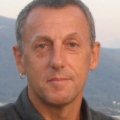
Carlos Ander Garbisu Crespo
NEIKER, Director Científico
Dr. Garbisu is the Scientific Director at NEIKER, The Basque Institute of Agricultural Research and Development (Spain), where he leads the Soil Microbial Ecology Group (http://www.soilmicrobialecology.com). He obtained his PhD degree in Biology at King’s College London (1992). Then, he carried out postdoctoral studies in the Department of Biochemistry and Molecular Biology of the University of the Basque Country (1992-1993, 1996-1997) and in the Department of Plant Biology of the University of California at Berkeley (1993-1996). He has published more than 135 international papers (h-index=42), participated in more than 70 research projects, and taught a great deal of courses at the university level. He has participated in many scientific committees and acted as project evaluator for many organizations.
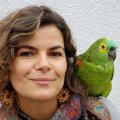
Vanessa Hansson de Oliveira
Doctora en Derechos Difusos y Colectivos por la Pontificia Universidad Catolica de São Paulo (PUC-SP), Brasil. Post-doutoranda en investigación direccionada a las Políticas Públicas del buen vivir. Especialista y maestra en Derecho Ambiental. Experta de la Plataforma Harmony with Nature de Naciones Unidas. Presidente de la OSCIP MAPAS.
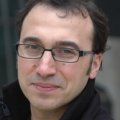
Raúl Ibáñez Torres
UPV/EHU, Matemáticas
Licenciado en Matemáticas, Doctor en Matemáticas (Premio Extraordinario). Profesor Titular de Geometría (UPV/EHU). Investigación en Geometría Simpléctica y Cultura Matemática. 29 proyectos de investigación y 9 investigador principal, 23 artículos de investigación en revistas internacionales. Autor libros: La cuarta dimensión, El sueño del mapa perfecto (2010), Del ajedrez a los grafos, la seriedad matemática de los juegos (2015), de RBA, Cayley, el origen del álgebra moderna (2017), de RBA. Los secretos de la multiplicación (2019) de Catarata. Director portal DivulgaMAT, Centro Virtual de Divulgación de las Matemáticas. Ha sido vicepresidente de la Real Sociedad Matemática Española; presidente y miembro de su Comisión de Divulgación; miembro del Raising the Public Awareness of Mathematics EMS; Socio fundacional de la AEAC-Asociación Española para el Avance de la Ciencia. Miembro de DIMA, la red de divulgación matemática. Guionista y presentador del espacio Una de Mates en la 2 de TVE.
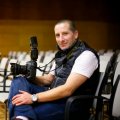
Javier Diego Iraeta
Grado Superior en Automoción, actualmente trabaja en una estación de Inspección Técnica de Vehículos. Su vocación han sido siempre las ciencias naturales y el mundo audiovisual. Se considera un fotógrafo semiprofesional. Dentro de esta temática la fotografía de naturaleza le apasiona. En el año 2013 y 2014 realizó estudios de fotografía en HILARGI (taller de estudios fotográficos) en Bilbao. www.500px.com/Javier Diego; flickr.com/photos/jabier1973; www.facebook.com/Jabier.
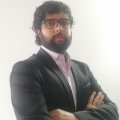
Nicolás Jiménez Iguarán
Philosopher from the Universidad de los Andes. MSc in Sustainable Development and Environment from the University of Manizales. PhD student at the University of the Basque Country/Euskal Herriko Unibertsitatea (UPV/EHU). National Leader of Multidimensional Inclusion of the National Open and Distance University (UNAD). Coordinator of the RI + 3 Biomimicry Network (International Network for Biomimicry Studies) and the Observatory of Political Ecology and Environmental Thought.

José Miguel León

Ander Lezamiz
Profesional de la música popular y folclórica vasca, es txalapartari, txistulari, albokalari, trikitrilari y dantzari. Con una amplia experiencia en eventos en el ámbito público como en el privado: bodas, homenajes, inauguraciones, recepción a grupos de turistas, entregas de premios, etc. Nos ofrece muchas posibilidades de integrar la cultura vasca, con un toque original a sus actos importantes, y, a la vez, hacer un guiño a nuestra cultura milenaria.
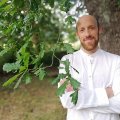
Erlantz Lizundia Fernández
Erlantz Lizundia is Associate Professor at the Faculty of Engineering in Bilbao, University of the Basque Country (UPV/EHU). He received his Ph.D. in Advanced Materials Engineering in 2011 at the UPV/EHU. He joined the University of the British Columbia (Canada) and ETH Zurich (Switzerland) in 2016 and 2018 as a visiting scientist. His research is devoted to the development of renewable‐material‐based multifunctional nanohybrids for energy storage, catalytic, optical, and environmental remediation applications. He also works on the ecodesign of novel materials and technologies, including energy storage, through life cycle assessment methodology.
Teresa López de Armentia Iturralde
Dr. in Chemistry from the University of Navarra, specializing in environmental technologies. She works in the ONGD Zabalketa in the management of Development Cooperation projects. She works in the area of Education for Social Transformation developing activities and educational proposals on sustainable human development in vocational training centers and universities in the Basque Country. She teaches in the Master of Sustainable Development and SDGs of the Unesco Chair. As an environmental specialist, she coordinates, through the Global Sustainable Development Network, a line of work focused on the search for innovative solutions based on nature to meet the needs of the most vulnerable population, strengthen their capacities and contribute to the restoration of degraded ecosystems (the fog water harvesting technique is being used in different rural areas of Peru and Bolivia). She actively participates in the Ri3 Biomimicry Network. She is a promoter of Redmujeres.net
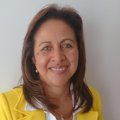
Gloria Marlene Díaz
Business Administrator, specialist in project formulation and evaluation, Master in Business Creation and Management and Doctor in Business Sciences. Currently, Director of the Entrepreneurship and Innovation Unit Emprende+ of the Universidad Externado de Colombia and researcher in Entrepreneurship and Innovation Management. She has been an entrepreneur and CEO in the manufacturing and services industry. She shares her experience as a member of SME boards, mentor and advisor with more than 18 years of experience. She accompanies entrepreneurs in management innovation, process innovation and product innovation. She is the creator of the Entrepreneurship and Innovation Unit Emprende+, is a member of the Entrepreneurship University Network REUNE-ASCUN, REUNE Cundinamarca node, Regional Network of Entrepreneurship, International Network of Biomimicry, International Node of Entrepreneurship and Business Innovation Biomimetic and participates in the entrepreneurship ecosystem.
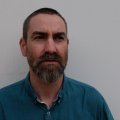
Alex Mitxelena Etxeberria
ETS de Arquitectura. UPV/EHU
Architect (2002) and doctor (2014) by the University of the Basque Country (UPV/EHU) and Professor of Architectural Projects since 2004 in the Department of Architecture at the University of the Basque Country (UPV/EHU). Deputy Director of Quality and Educational Innovation since 2017, Coordinator of the Degree in Fundamentals of Architecture since 2015 and Academic Secretary (2016-2017) at the School of Architecture of the University of the Basque Country (UPV/EHU). I am part of the research group zak (www.zak.eus) since 2018. Interdisciplinary group of the UPV/EHU that studies the relationship between care and architectural design in the housing environment and that takes into account human needs and the essentially communitarian nature of human beings and that promotes the creation of spaces of coexistence. Professional studio since 2003, whose professional career is mainly focused on the development of housing projects and new ways of living.
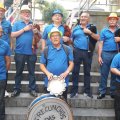
Grupo Os Recunchos Das Pontes
Grupo de música aficionado lo conforman personas pensionistas, que les gusta el folclor español, en especial el de Galicia y Asturias. Participan con su alegría en eventos familiares e institucionales. Usan la música como medio para difundir las buenas prácticas del tiempo de ocio y diversión, para tener una salud integral en armonía con la Naturaleza y la sociedad.
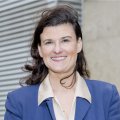
Noemi Peña Miguel
UPV/EHU
Noemí Peña-Miguel is a professor and researcher at the Faculty of Economics and Business. She holds a PhD in Economics and Business Administration from the University of the Basque Country (UPV/EHU). Extraordinary Doctorate Award from the UPV/EHU. Director of Entrepreneurship and Transfer of the Bizkaia Campus of the University of the Basque Country (UPV/EHU) since January 2018 and responsible for the Zitek program for the promotion of entrepreneurial culture and the creation of innovative and technology-based companies. She has worked as Deputy to Management, and to the Financial and Human Resources management in Grupo Urgatzi, a group of companies in the socio-health sector from 2000 to 2011.
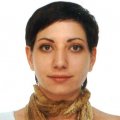
Serena Pisano
Doctora en Bellas Artes por la Universidad Politécnica de Valencia y experta en la organización y gestión de eventos culturales. Empezó su carrera investigadora después del Máster en Ciencias Humanas con especialización en Historia del Arte Contemporáneo por la Universidad La Sapienza de Roma. Tiene el Máster en Filosofía Estética por la Universidad Roma Tre de Roma y otro Máster en Producción Artística de la Universidad Politécnica de Valencia. Actualmente, es funcionaria en el Museo di Roma (Italia). Su trabajo de investigación se centra en la semiótica del arte transgénico y biotecnológico y en el net.art.
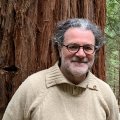
Manuel Quirós Galdón
Manuel Quirós (Málaga, Spain 1962) graduated (UCM), Master (Stirling) and PhD in Biology (UPM), is pro-environmental conservationist, has published more than 130 scientific and informative papers in national and international journals on sustainability, biomimicry or natural capital. After 10 years as a postdoctoral researcher, he decided to explore new fields and in 2006 he started teaching Sustainability Education in design, fashion, architecture and business universities. He is currently an associate professor at the Instituto de Empresa in Madrid where he is also Director of the Slow Fashion Lab, he also teaches at the University of Navarra, in the Master of the Unesco Chair of the UPV/EHU and at the University of Maryland, School of Business. Self-taught in Biomimicry in 2010 he created the consulting firm Natureinspireus (NIU) pioneer in Spain, focused on natural strategies for companies. Co-founder of Red Ri3 de Biomimesis and Biomimicry Iberia.
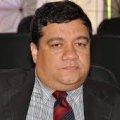
José Claudio Rocha
Post-Doctorado en Derecho por la Universidad Federal de Santa Catarina (UFSC) Centro de Ciencias Jurídicas (CCJ), Centro de Investigación en Derecho Internacional Eirene, [2014-2015]; Doctorado en Educación por la Universidad Federal de Bahía (UFBA) [2001-2006]; Maestría en Educación de la UFBA [1998- 2001]; Especialista en Administración Pública de la Universidad Estadual de Feira de Santana (UEFS) [1997]; Especialista en Gestión de Proyectos de Investigación y Postgrado de la Universidad Federal del Estado de Río de Janeiro (UNIRIO) [2014]; Especialista en Ética Docente, Desarrollo y Capital Social del Instituto de Estudios Avanzados para las Américas (INEAM) de la Organización de los Estados Americanos (OEA) [2005]; Especialista en Derechos Humanos de la Universidad de Brasília / Ágere Incidencia / Secretaría Especial de Derechos Humanos de la Presidencia de la República (SEDH / PR) [2006].
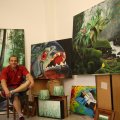
Omar Rodríguez Da Silva
Es de la etnia de pueblo Ticuna que vive en la frontera entre Brasil, Colombia y Perú. De niño, a una edad de 7 años, ya mostraba su inclinación hacia el arte, pintando, y dibujando en las paredes de madera en su casa, haciendo esculturas en arcilla y tallas en tiza, trabajando desde ese entonces la figura humana a la perfección. Fue galardonado por el Congreso de la República de Colombia con la” Condecoración Orden, Dignidad y patria”. con Hizo su primera exposición a la edad de 16 años en su tierra natal dándose a conocer y mostrando su talento como una de las promesas del arte en el Amazonas. Recorriendo gran parte del país pudo vivir y darse cuenta del maltrato, tráfico y explotación de muchas especies de la fauna nacional, por eso se dedicó desde entonces a trabajar por la conservación y protección de la riqueza natural de su país. Más de 100 exposiciones que van desde la pintura y la escultura; su otra pasión es el deporte del boxeo.
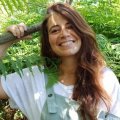
Lide Rodríguez Martínez
Doctora en Químicas por la Universidad de Cambridge, Licenciada por la UPV/EHU y cuenta con más de 20 años de experiencia en investigación y desarrollo tecnológico en temas de pilas de hidrógeno de óxido sólido y baterías. Pero sobre todo es amante de la naturaleza. Ha trabajado en Gaiker reciclando plásticos y como investigadora de la UPV-EHU. Posteriormente trabajó 14 años en Ikerlan en el desarrollo de tecnologías para la conversión y el almacenamiento de energía, incluyendo la transferencia de tecnología de pilas de combustible desde el LBNL en California. En 2015 pasó a trabajar al CICenergigune creando equipos para el desarrollo de nuevas baterías e impulsando el desarrollo de investigación orientada a la industria, llegando a ser la Coordinadora de Tecnología. Ha dirigido 6 Tesis doctorales, proyectos nacionales y europeos y cuenta con más de 75 publicaciones en revistas científicas internacionales y 4 patentes internacionales.
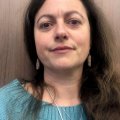
Ludovica Rossi
Ludovica Rossi es arquitecta por la Universitá degli Studi di Roma III (2004), ha realizado el Master de Tecnología en la Arquitectura (2010) y es doctora en Tecnologia de l'Arquitectura, de l'Edificació i de l'Urbanisme por la Escuela Técnica Superior de Arquitectura de Barcelona – Universitat Politecnica de Cataluña (2019). En su estudios de doctorado ha analizado el esqueleto interior de madera de los cactus para su aplicación a sistemas en flexión activa con banda de rodadura de neumáticos reciclados. Desarrolla su trabajo profesional de forma independiente entre las provincias de Tarragona y Barcelona, prevalentemente en el campo de la rehabilitación de edificios. Su actividad investigación se centra en la aplicación morfologías y estructuras bio-inspiradas (tensegrity, tenso estructuras, sistemas autoorganizados, etc.) con una atención a los aspectos ecológico y del ciclo de vida de los materiales. Integra la investigación bio-inspirada con instalación de arquitectura efímera.
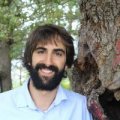
Beñat Urrutikoetxea Arrieta
I'm looking for projects to close circles and improve education. I love teaching, marketing, social media platforms, entrepreneurship and research from a professional point of view. I am team coach in Mondragon Team Academy (Mondragon University) and member of Societing and DOI elkartea. In the past proud to be professor in the Faculties of Economics and Business (University of Basque Country and University of Granada). Delighted to be part of JIFFI. Before I was entrepreneurship technician in UGRemprendedora, now part of the family. I have also been professor and jury member in the Masters associated with UNIR in marketing. Everything will get better when we realize that the world is there to learn, then we will close the circle. Always in teams: shall we talk? Behar duzunerako!
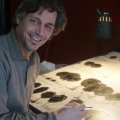
Manu vb Tintore
Ingeniero Agrónomo. Postgraduado en el año 2000 por la Escola d'Art d'Olot, comenzó su carrera artística como escultor y pintor. Toda su obra está ligada a la idea del ser humano, su futuro y su relación con el entorno que le rodea. Diez años de trabajo como ingeniero agrícola internacional para la ONU en diversos países en desarrollo de África y América impregnan su obra de una globalidad y un existencialismo abrumadores.
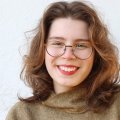
Carolina Veloso Ferreira
Diseñadora portuguesa. Apasionada por la biomimética como herramienta para construir un futuro más sostenible, productivo, creativo y empático. Ha trabajado con fotografía, escultura, pintura, diseño gráfico, ilustración, instalación, curaduría, diseño de producto. Se formó en teatro amateur con ACE Teatro do Bolhão en la ciudad de Porto. Estudió piano y canto lírico en el Conservatorio Regional de Gaia. Realizó un curso artístico especializado en Diseño Gráfico en la Escuela de Arte Soares dos Reis y realizó una pasantía en la oficina de diseño ColorADD, en la implementación del sistema de identificación del color para daltónicos. Actualmente es diseñadora y creativa en Biomimicry Granada y estudiante de Arte y Diseño en la Universidad de Leeds en Inglaterra. Se formó en diseño biomimético (Biomimicry Argentina y CeSus, BRUTAL, Biomimicry South Africa, y Minneapolis College of Art and Design). Es parte del proyecto para fundar Biomimicry Portugal.

Isabella Sabrié
Soprano solista francesa, premiada en varios concursos internacionales (Placido Domingo Opera World Competition...), recibió un Primer Prémio de Ópera del “Conservatoire National Supérieur de Musique et de Danse de Paris. Es diplomada en musicología de la Universidad Sorbonne-Paris IV, y há sido invitada internacional para cantar óperas, oratorios y recitales. Compositora y fascinada por los sonidos del bosque amazónico. Trasladó su residencia a la ciudad Manaus (Brasil) donde reside desde el año 2007, donde reside hasta el día de hoy. Investiga la biofonía con pasión, descubriendo la armonía rítmica-espacial natural. Fue también profesora en la Universidad de Estado do Amazonas. Consultora para la Agência Amazonense de Desenvolvimento Cultural, y es citada por él filósofo Edgar Morin que sigue sus líneas de investigación. www.isabellesabrie.com.
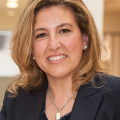
María Saiz Santos
UPV/EHU
PhD in Economics and Business: Entrepreneurship, University of the Basque Country (UPV/EHU) and professor of entrepreneurship and business creation at the same university. Professor of entrepreneurship in 5 masters, including the Master in Biomedical Research. Executive Director of GEM Euskadi, Global Entrepreneurship Monitor, founding research member since 2004. Steering Committee of GEM Spain Treasurer. President of the Basque Entrepreneurship Observatory. Director of the Master's Degree in Entrepreneurship and Business Management, MBAe3, University of the Basque Country UPV/EHU. Technical Committee of Startinnova (High School Entrepreneurship Program). Director of External Relations, Bizkaia Campus, UPV/EHU (2007-2014). Director and founder of the Spin offs creation program, ZITEK; Management of 3 incubators for new technology-based companies. Definition of policies and programs to promote entrepreneurship, among others: Bus Emprende, Etorkizulan and Think Big.
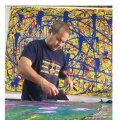
Jaime Enrique Salinas Bernal
Desarrolla su actividad artística inspirado en la Naturaleza, donde sus respectivas obras de pintura como de escultura, son una aproximación a la belleza que nos oculta la Madre Tierra y el Universo. Este periodo anómalo por la que pasa la humanidad por la pandemia de CV19, ha sido un catalizador de oportunidades para ampliar el proceso de creativo y la bioinspiración. Se puede considerar su obra escultórica como transgresora, ya que ha creado su propia línea de trabajo denominada Arte Alienígena. Expresa en su trabajo de Arte Alienígena, como la materia y la energía en su conjunto se vuelve ceración humana, tanto en sus pinturas como en sus esculturas; por ser dos dimensiones interdependientes e interrelacionadas que vienen del cosmos, desde sus orígenes hasta los tiempos actuales y futuros. Este arte Alienígena se caracteriza por ser la metamorfosis de lo material e inmaterial de las ideas, que se concretizan en sus numerosas obras de escultura, pintura y poesía.
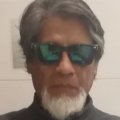
Hugo Salinas Intiraimi
Estudios artísticos en la Escuela de Artes Plásticas de San Salvador de Jujuy- Argentina. Estímulo de Bellas Artes en Buenos Aires. Exposición de talleres Asociación Estímulo de Bellas Artes, Galería Ernesto de la Carcova Buenos Aires. Varias exposiciones con los talleres del colectivo Antzezaleak de Algort. Certamen Internacional de Grabado Máximo Ramos (El Ferrol Galicia). 6ª Exposición Mini Gravat Internacional de Cadaques (Catalunya). Certamen en de Grabado Carmen Arozena Galería Tórculo (Madrid), Bizkaiko Artea ´88, XVIII Bienal de Grabado de Ljbljana (Yugoslavia). Exposiciones individuales: Sala de exposiciones de la Biblioteca Popular de San Salvador de Jujuy- Argentina; Espacio Latino Americain – París; Edificio la Bolsa Alde Zaharra Bilbao.
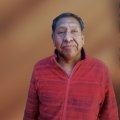
Isidro Salinas Salinas
Nació Jujuy, Argentina. Músico autodidacta e intérprete de instrumentos y melodías andinas, que son una inspiración en la Naturaleza y las culturas tradicionales. Su música es una manifestación de las culturas andinas que históricamente han vivido en Armonía con la Madre Tierra y la “Pacha Mama”. Desarrolla sus conciertos de forma individual, en grupo y colabora con otros artistas de la música.

María Mercedes Sánchez
Maria Mercedes Sanchez has over 20 years of experience working in the field of sustainable development and intergovernmental processes, including the involvement of major groups and other stakeholders through every stage of the implementation process of a variety of UN mandates. He has worked extensively in the areas of research, report writing, project management and communications and has participated in four major UN Conferences on Sustainable Development: UNCED (1992), Rio+5 (1997), Rio+10 (2002), Rio+20 (2012), as well as in the preparations leading to the adoption of the 2030 Agenda adopted by the General Assembly in 2015. Since the inception of the Harmony with Nature Program of the United Nations in 2009, she has been the coordinator and leads the Program to support the principles of Earth jurisprudence in the implementation of the 2030 Agenda among the different stakeholders and, in particular, in reference to the implementation of Sustainable Development Goal 12.
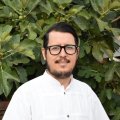
David Sánchez Ruano
PhD in Design, specialist in ecopedagogy, Biomimicry and regenerative design. Professor at the School of Art, Architecture and Design of the Tecnológico de Monterrey. He teaches courses on social innovation, biomaterials and sustainability strategies.
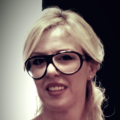
Carmen SanFrancisco
With a degree in Business Administration and Management and studies in Occupational Risk Prevention at the UPC, she is an entrepreneur dedicated to the direction and financial management in innovation and audiovisual models, and executive producer also in financial designs. She currently directs the BIOMIMETIC SCIENCES INSTITUTE foundation as General Director and has been dedicated for more than 15 years to the management and coordination of research projects both nationally and internationally within the framework of the Horizon program. Owner of the consulting firm Catalana de Ingeniería, she is Director of Innovation and Design of Large Projects. She participates in networks such as the International Network of Biomimicry Studies (RI-BIOMIMICRY NETWORK) and the International Network of Ecological Ruralities (RIRES).
Summary
Conclusions sent by the direction of the Summer Course
Sustainable development goals
Agenda 2030 is the new international development agenda approved in September 2015 by the United Nations. This agenda aims to be an instrument to favour sustainable human development all over the planet, and its main pillars are the eradication of poverty, a reduction in equality and vulnerability and fostering sustainability. It is a unique opportunity to transform the world up to 2030 and guarantee human rights for all.

3 - Good health and well-being
Guarantee a healthy life and foster the well-being of all people of all ages. Key issues: universal healthcare coverage, sexual and reproductive health, reduction in the number of road accident casualties, pollution and chemical products, reduction in maternal and neonatal mortality, the end of epidemics such as AIDS, combating hepatitis and other water-borne diseases, drug and alcohol prevention, control of tobacco.
More information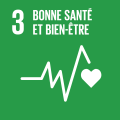
4 - Quality education
Guarantee quality education that is inclusive and equitable and foster opportunities for lifelong learning for everyone. Key issues: free-of-charge, equitable and quality education, access to higher education and training on an equal basis, education for sustainable development, suitable education centres for persons with disabilities, and safe, non-violent and efficient learning environments.
More information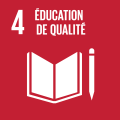
5 - Gender equality
Achieve gender equality and empower all women and young girls. Key issues: the end of all forms of discrimination and violence, recognition of unpaid care and domestic work, shared responsibility, equal opportunities, full and effective participation in reproductive rights, equal rights vis-à-vis economic resources, access to land and other assets and ownership.
More information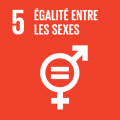
11 - Sustainable cities and communities
Make cities and other human settlements inclusive, safe, resilient and sustainable. Key issues: access to suitable housing and basic services that are secure and affordable, suitable and sustainable transport systems, inclusive urban planning, participative planning and management, protection of cultural and natural heritage, air-quality, green zones, and connections between urban, peri-urban and rural areas.
More information
12 - Responsible consumption and production
Guarantee sustainable modalities of consumption and production. Key issues: sustainable management and efficient use of natural resources, reduction of chemical particles released to the atmosphere, water and soils, reduction of waste products, recycling, reuse and reduction, sustainable practices, sustainable public procurement, sustainable lifestyles, rationalisation of inefficient subsidies for fossil fuels.
More information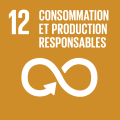
15 - Life on land
Protect, establish and foster the sustainable use of terrestrial ecosystems, manage forests sustainably, fight desertification, hold back and reverse the degradation of land and delay the loss of biodiversity. Key issues: the fight against desertification, reforestation, conservation, the regeneration and sustainable use of terrestrial ecosystems, natural habitats, biodiversity, invasive exotic species, integration of the values of ecosystems into planning, poaching.
More information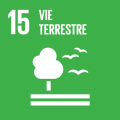
17 - Partnerships for the goals
Strengthen the means of implementation and revitalise the World Alliance for Sustainable Development. Key issues: mobilisation of resources, 0.7% of GDP for official overseas development aid, finances, cooperation in technology and innovation, ecologically rational technologies, skills building, universal and multilateral trade system, coherence on the legislative and institutional levels, availability of data, supervision, indicators and accountability.
More information